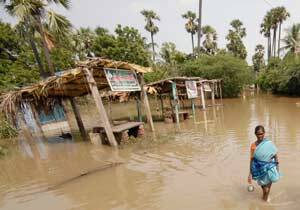The international tug-of-war over carbon emission thresholds and other instruments meant to limit the climate effects of greenhouse gases has generated a lot of talk—and some reluctant commitments. But one pressing item related to climate change has so far escaped serious discussion among international policymakers: how to respond to potential waves of “climate refugees,” people forced from their homes because of climate change. If even moderate effects from climate change occur as predicted, millions of people will be uprooted in the near future by rising sea levels, extreme weather events, droughts and water scarcity.
When it comes to climate-change migration “everybody jumps on the bandwagon and waves their own agenda,” said Professor Frank Biermann, an expert in global environmental governance, in a keynote presentation at a recent conference on the issue in Geneva, Switzerland. The event was sponsored jointly by the World Council of Churches, Bread for the World and the Pacific Conference of Churches. Even environmentalists, Biermann said, are guilty of dramatizing the plight of Pacific islands likely to be submerged by the end of the century without proposing a practical response. To them Tuvalu, a threatened Pacific island state, is just a canary in a coal mine, Biermann charged.
“In order to put the rights of these vulnerable populations on the agenda of the international community, we must build bridges between academia, civil society organizations, governments and churches working on the issue of climate change,” said Guillermo Kerber, a World Council of Churches program executive on climate change. Finding the right words to describe people who will be forced to migrate because of deteriorating climatic conditions is the first difficulty on the road toward building protocols that could be codified in international law. United Nations terminology makes fine distinctions between migrants, refugees and internally displaced people, depending on the hows and whys of their displacement. Did they cross international borders? Were they the target of persecution? How immediate was the threat to their lives and their human rights?
Similarly a specific international regime is needed for the people uprooted by climate change, according to Biermann. Those affected share a number of characteristics that set them apart from the political refugees and economic migrants the world has seen in the past. Climate refugees will not be able to return to their homelands after a temporary asylum; they are likely to migrate in large numbers, collectively and relatively predictably; and, most important, they have a strong moral and legal claim against the international community, since the world’s richest nations have done the most to cause their problems.
That is why Biermann argued that “a new legal instrument specifically tailored for the needs of climate refugees” needs to be created “as well as a separate funding mechanism.” A protocol to the existing U.N. Framework Convention on Climate Change could be such an instrument.
However the international community determines to respond to this new breed of refugee, more urgency on the issue is required. At the conference Peter Emberson, a climate change campaigns officer for the Pacific Conference of Churches, described the experience of Carteret Islanders whose evacuation was ordered by the government of Papua New Guinea in 2003. “Resettlement is already taking place in the Pacific,” Emberson said.








